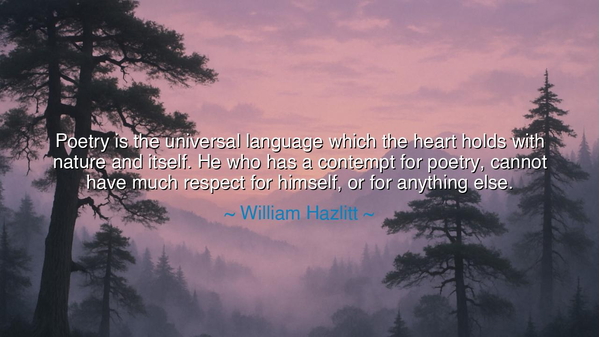
Poetry is the universal language which the heart holds with
Poetry is the universal language which the heart holds with nature and itself. He who has a contempt for poetry, cannot have much respect for himself, or for anything else.






Hear the stirring words of William Hazlitt, who declared with passion: “Poetry is the universal language which the heart holds with nature and itself. He who has a contempt for poetry, cannot have much respect for himself, or for anything else.” This is no mere praise of verse, but a revelation of the very soul of humanity. For Hazlitt proclaims that poetry is not confined to books or rhymes, but is the eternal dialogue between the human heart and the great expanse of creation. It is the language through which man communes with the wind, the sea, the stars, and the depths of his own being.
The meaning of these words lies in the recognition that poetry is not an ornament, but a necessity of the soul. Without poetry, the heart is silent, blind to beauty, deaf to the whispers of truth. To despise poetry, Hazlitt warns, is to cut oneself off from reverence for life itself. For one who scorns poetry reveals a spirit hardened, one that cannot truly respect itself, nor the sacredness of others. In contempt for poetry lies contempt for wonder, for imagination, and for the deeper truths that reason alone cannot capture.
The origin of such thought can be traced to the Romantic age, when Hazlitt and his contemporaries sought to restore to the human spirit its bond with nature and with feeling. The Enlightenment had exalted reason, but Romanticism reminded humanity that reason without beauty is barren, and logic without passion is lifeless. Hazlitt saw in poetry the bridge between intellect and soul, a universal tongue that speaks across nations and centuries, uniting all who dare to feel deeply.
History itself affirms his words. Consider the Psalms of David, sung thousands of years ago, yet still stirring the hearts of millions today. These songs are poetry, the heart of man crying out to the eternal. Or think of Homer, whose verses carried the spirit of Greece through ages, binding warriors, rulers, and common men alike to the eternal themes of glory, loss, and longing. These works prove that poetry is universal, transcending time and place, for it springs not from culture alone, but from the very depths of the human condition.
Hazlitt also reminds us that self-respect is tied to our reverence for poetry. For to honor poetry is to honor the heart’s capacity for wonder and beauty. A man who denies poetry denies the noblest part of himself, preferring only the coarse and the utilitarian. Such a man may amass wealth or power, but he cannot be truly alive, for he has silenced the language of the soul. To love poetry is to acknowledge that we are more than flesh and calculation—we are beings of spirit, longing, and song.
The lesson, then, is clear: do not neglect poetry. Read it, speak it, sing it, or even live it. Let the verses of others remind you of your own hidden truths, and let your heart learn to converse again with nature and with itself. In moments of grief, poetry will console; in moments of joy, it will exalt; in moments of confusion, it will guide. It is the voice of humanity distilled into words that carry the weight of eternity.
And so, let your actions follow. Take time each day to listen to poetry, whether in the songs of birds, the rhythm of rain, or the written lines of the poets. Teach children to love it, not as mere schoolwork, but as the heartbeat of humanity. Write your own, even if clumsy, for in the attempt you awaken your soul to speak. For in revering poetry, you revere life itself, and in rejecting it, you reject the noblest mirror of your own spirit.
Thus remember Hazlitt’s eternal truth: “Poetry is the universal language… He who has a contempt for poetry, cannot have much respect for himself, or for anything else.” Cherish poetry as you cherish your breath, for it is the breath of the heart. In honoring it, you honor yourself, your fellow man, and the boundless mystery of existence itself.






AAdministratorAdministrator
Welcome, honored guests. Please leave a comment, we will respond soon